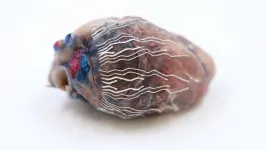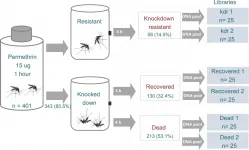Beneficial bacteria can be restored to C-section babies at birth
2021-06-17
(Press-News.org) New Brunswick, N.J. (June 17, 2021) - Babies born by cesarean section don't have the same healthy bacteria as those born vaginally, but a Rutgers-led study for the first time finds that these natural bacteria can be restored.
The study appears in the journal Med.
The human microbiota consists of trillions of bacteria, viruses, fungi and other microorganisms - some beneficial, some harmful -- that live in and on our bodies. Women naturally provide these pioneer colonizers to their babies' sterile bodies during labor and birth, helping their immune system to develop. But antibiotics and C-sections disturb this passing of microbes and are related to increased risks of obesity, asthma and metabolic diseases.
The researchers followed 177 babies from four countries over the first year of their lives -- 98 were born vaginally and 79 were born by C-section, 30 of which were swabbed with a maternal vaginal gauze right after birth.
Lab analysis showed that the microbiota of the C-section babies swabbed with their mother's vaginal fluids was close to that of vaginally born babies. Also, the mother's vaginal microbiomes on the day of birth were similar to other areas of their bodies (gut, mouth and skin), showing that maternal vaginal fluids help to colonize bacteria across their babies' bodies.
This was the first large observational study to show that restoring a C-section baby's natural exposure to maternal vaginal microbes at birth normalizes the microbiome development during their first year of life. The researchers said the next step is conducting randomized clinical trials to determine if the microbiota normalization translates into disease protection.
"Further research is needed to determine which bacteria protect against obesity, asthma and allergies, diseases with underlying inflammation," said senior author Maria Gloria Dominguez Bello, a professor in the Department of Biochemistry and Microbiology in the School of Environmental and Biological Sciences at Rutgers University-New Brunswick. "Our results support the hypothesis that acquiring maternal vaginal microbes normalizes microbiome development in the babies."
According to the World Health Organization, C-section is needed in about 15 percent of births to avoid risking the life of the mother or child, but in many countries such as in Brazil, the Dominican Republic, Iran and China, C-section is performed in more than 70% of urban births.
INFORMATION:
Broadcast interviews: Rutgers University has broadcast-quality TV and radio studios available for remote live or taped interviews with Rutgers experts. For more information, contact John Cramer at john.cramer@rutgers.edu
ABOUT RUTGERS--NEW BRUNSWICK
Rutgers University-New Brunswick is where Rutgers, the State University of New Jersey, began more than 250 years ago. Ranked among the world's top 60 universities, Rutgers's flagship is a leading public research institution and a member of the prestigious Association of American Universities. It has an internationally acclaimed faculty, 12 degree-granting schools and the Big Ten Conference's most diverse student body.
[Attachments] See images for this press release:

ELSE PRESS RELEASES FROM THIS DATE:
2021-06-17
Woodlands along streams and rivers are an important part of California's diverse ecology. They are biodiversity hotspots, providing various ecosystem services including carbon sequestration and critical habitat for threatened and endangered species. But our land and water use have significantly impacted these ecosystems, sometimes in unexpected ways.
A team of researchers, including two at UC Santa Barbara, discovered that some riparian woodlands are benefitting from water that humans divert for our own needs. Although it seems like a boon to these ecosystems, the artificial ...
2021-06-17
SAN ANTONIO (June 17, 2021) -- Middle-aged people with depressive symptoms who carry a genetic variation called apolipoprotein (APOE) ε4 may be more at risk to develop tau protein accumulations in the brain's emotion- and memory-controlling regions, a new study by researchers from The University of Texas Health Science Center at San Antonio (UT Health San Antonio) and collaborating institutions suggests.
The Journal of Alzheimer's Disease published the findings in its June 2021 print issue. The research is based on depression assessments and positron emission tomography (PET) imaging conducted among 201 participants in the multigenerational Framingham Heart Study. The mean age of these participants was 53.
Decades before diagnosis
PET scans typically are conducted ...
2021-06-17
LOS ALAMOS, N.M., June 17, 2021 -- A research team from Los Alamos National Laboratory and Purdue University have developed bio-inks for biosensors that could help localize critical regions in tissues and organs during surgical operations.
"The ink used in the biosensors is biocompatible and provides a user-friendly design with excellent workable time frames of more than one day," said Kwan-Soo Lee, of Los Alamos' Chemical Diagnostics and Engineering group.
The new biosensors allow for simultaneous recording and imaging of tissues and organs during surgical procedures.
"Simultaneous recording and imaging could be useful during heart surgery in localizing critical regions and guiding surgical interventions such as a procedure for restoring normal ...
2021-06-17
Nanodecoys made from human lung spheroid cells (LSCs) can bind to and neutralize SARS-CoV-2, promoting viral clearance and reducing lung injury in a macaque model of COVID-19. By mimicking the receptor that the virus binds to rather than targeting the virus itself, nanodecoy therapy could remain effective against emerging variants of the virus.
SARS-CoV-2 enters a cell when its spike protein binds to the angiotensin-converting enzyme 2 (ACE2) receptor on the cell's surface. LSCs - a natural mixture of lung epithelial stem cells and mesenchymal cells - also express ACE2, making them a perfect vehicle ...
2021-06-17
Current approaches for planning relocation for potentially millions of people affected by climate change and related risks are "woefully inadequate" and risk worsening societal inequities, experts wrote in a policy perspective on June 17 in Science. Policymakers and scientists need to rethink how they work together to develop, communicate and carry out relocation plans.
"Relocation involves moving people away from risk and into totally new settings," said the team of experts led by Richard Moss. Moss is a Gerhard R. Andlinger Visiting Fellow at Princeton's Andlinger Center ...
2021-06-17
The Yellow fever mosquito (scientific name, Aedes aegypti) spreads multiple untreatable viruses in humans and is primarily controlled using a pesticide called permethrin. However, many mosquitoes are evolving resistance to the pesticide. A new study by Karla Saavedra-Rodriguez of Colorado State University and colleagues, published in the journal PLOS Genetics, identifies mutations linked to different permethrin resistance strategies, which threaten our ability to control disease outbreaks.
When treated mosquitoes encounter permethrin in the wild, they will do one of the following: immediately die, be knocked out but recover, or be unaffected. Saavedra-Rodriguez and her colleagues decided to investigate the genetic variations that lead to these ...
2021-06-17
A new treatment approach focused on fixing cell damage, rather than fighting the virus directly, is effective against SARS-CoV-2 in lab models.
Combination of two drugs reduces spread of SARS-CoV-2 infection in cells by up to 99.5%.
If found safe for human use, this anti-viral treatment would make
COVID-19 symptoms milder and speed up recovery times.
When a person is infected with SARS-CoV-2, the virus that causes COVID-19, it invades their cells and uses them to replicate - which puts the cells under stress. Current approaches to dealing with infection target the virus itself with antiviral drugs. But ...
2021-06-17
Patents with all-female inventor teams are more likely than all-male teams to address problems that specifically or disproportionately affect women, according to a new study. The findings, derived from an analysis of more than 440,000 U.S. biomedical patents filed from 1976 to 2010, suggest that who benefits most from innovation largely depends on who gets to invent. While the gender gap in research and innovation is well known, its broader impact on what gets invented - and for whom - isn't well understood. To address this question, Rembrand Koning and colleagues used machine learning text analysis to evaluate all U.S. biomedical patents filed from 1976 to 2010. They found that patents ...
2021-06-17
Daunting and uncertain is the future for people who must decide whether, where, when, and how to vacate their homes as the climate changes. Communities who will absorb this influx of uprooted people also face challenges. In a special issue of Science, "Fallback Strategies: Planning for Climate-Induced Relocation," experts examine ways in which interdisciplinary basic and applied research can - and must - engage with and support communities and governments navigating this landscape. As this work is done, "we must consider not only what science can do, but how science ...
2021-06-17
Using LIGO's suspended mirrors, researchers have demonstrated the ability to cool a large-scale object - the 10-kilogram optomechanical oscillator the suspended mirrors form - to nearly the motional quantum ground state. Upgrading LIGO (Laser Interferometer Gravitational-Wave Observatory) with such a modification would not only increase the device's sensitivity and range in detecting gravitational waves but could also provide new insights into large-scale quantum phenomena. For most mechanical objects to be coaxed into a quantum state, they need to be cooled to exceedingly low temperatures to overcome the thermal vibrations, or phonons, that mask the signature of quantum motion. This brings the ...
LAST 30 PRESS RELEASES:
[Press-News.org] Beneficial bacteria can be restored to C-section babies at birth



